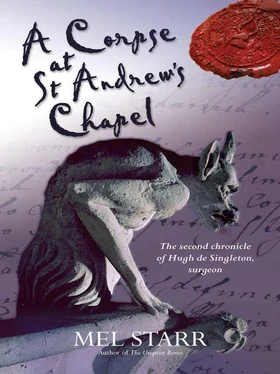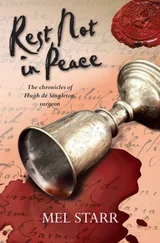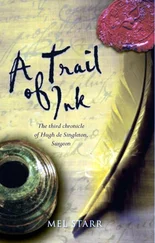Mel Starr - A Corpse at St Andrew's Chapel
Здесь есть возможность читать онлайн «Mel Starr - A Corpse at St Andrew's Chapel» весь текст электронной книги совершенно бесплатно (целиком полную версию без сокращений). В некоторых случаях можно слушать аудио, скачать через торрент в формате fb2 и присутствует краткое содержание. Год выпуска: 2010, Издательство: Kregel Publications, Жанр: Исторический детектив, на английском языке. Описание произведения, (предисловие) а так же отзывы посетителей доступны на портале библиотеки ЛибКат.
- Название:A Corpse at St Andrew's Chapel
- Автор:
- Издательство:Kregel Publications
- Жанр:
- Год:2010
- ISBN:нет данных
- Рейтинг книги:5 / 5. Голосов: 1
-
Избранное:Добавить в избранное
- Отзывы:
-
Ваша оценка:
- 100
- 1
- 2
- 3
- 4
- 5
A Corpse at St Andrew's Chapel: краткое содержание, описание и аннотация
Предлагаем к чтению аннотацию, описание, краткое содержание или предисловие (зависит от того, что написал сам автор книги «A Corpse at St Andrew's Chapel»). Если вы не нашли необходимую информацию о книге — напишите в комментариях, мы постараемся отыскать её.
A Corpse at St Andrew's Chapel — читать онлайн бесплатно полную книгу (весь текст) целиком
Ниже представлен текст книги, разбитый по страницам. Система сохранения места последней прочитанной страницы, позволяет с удобством читать онлайн бесплатно книгу «A Corpse at St Andrew's Chapel», без необходимости каждый раз заново искать на чём Вы остановились. Поставьте закладку, и сможете в любой момент перейти на страницу, на которой закончили чтение.
Интервал:
Закладка:
This is surely so. There are those of the gentry who provide much for the commons to talk about. Lady Petronilla was not such a one to furnish a fertile plot for imaginings to grow, but gossip is a vigorous weed and can take root and prosper in the thinnest soil. I did not ask what the stationer had heard of Lady Petronilla, nor did he volunteer the information.
“You have done such surgery before?” The man asked.
“Many times.”
“And was’t successful?”
“Not always. A good result depends on what has caused the fistula. If the abscess be too deep, or the product of a cancer, the surgery will not answer.”
“But such as mine?”
“I must examine the fistula before I can say if success is likely. But for injuries such as you describe, good fortune often accompanies the work.”
The stationer shrugged, looked to his daughter and spoke. “Kate, mind the shop while Master…Hugh, is it?” I nodded. “While Master Hugh has a look at my back.”
Kate! The girl’s name was Katherine.
The stationer led me to stairs which climbed to the living quarters above the shop. He grimaced once as he twisted to free himself from his cotehardie, and again as he drew up his kirtle. A linen belt wrapped around his body obscured the fistula, but a stain on the cloth showed clearly where it lay.
The stationer unwrapped the linen girdle, the turned his back to me. “’Tis a great trial. What think you? Can you deal with it, or will this be the end of me? I don’t like to talk so before Kate, but I know a thing like this can take a man to his grave.”
“It could,” I agreed. “A stick of wood did this, you say?”
“Aye. Broken it was, and sharp. Punched through cotehardie and kirtle like a blade.”
“You fell a great distance?”
“Aye. The ladder broke when I would have repaired the sign above my father’s shop in Cambridge. The sign came down in a storm, whence came the splinter as well. Pitched me into the street on my back.”
“Did any fragments of the broken limb work out of the wound?”
“After Kate drew the splinter from my back? Not that I recall.”
“You suffer pain when you twist your body, is this not so?”
“Aye.”
I pulled the skin of the stationer’s back apart the better to see the fistula, then squeezed the flesh together. The man gasped, and yellowish pus oozed from the injury.
“Can you do aught for me?” he asked through clenched teeth.
“I can. ’Tis my belief that a fragment of the stick you fell on may be lodged in your back.”
“You can remove it?”
“Aye, but not today. My instruments are in Bampton.”
“When? Tomorrow?”
“You are eager to see this done,” I smiled.
“Was it your back and your wound, you would be also.” He chuckled in spite of his discomfort.
“’Tis so, I’m sure. I have business for Lord Gilbert tomorrow, but next day I will return to deal with this. You should have ready then a jug of wine, and some ale.”
“You wish me drunk for this surgery?”
“No,” I laughed. “I will put powdered herbs into the ale. They will help you deal with the pain. The wine is to wash the wound when I am done.”
“Day after tomorrow, you say?”
“Aye. And now I must return to Bampton. I have purchased a gathering of parchment and a pot of ink. What is your charge?”
“Ah…if you can relieve me of this affliction I will supply all the parchments and ink you wish until the Lord’s return.”
As he spoke the man wrapped himself in the stained linen belt and donned his kirtle and cotehardie.
“You have the better of me,” I said. “You know my name, I do not know yours.”
“I am remiss,” he frowned. “My injury often drives other thoughts from my mind. I am Robert Caxton. My daughter, Katherine, you have met.”
“Indeed. A most lovely young woman.”
I feared I had misspoke myself, for the stationer made no reply, nor even gave me a glance. No doubt he had heard such appraisals before.
Caxton was on his way down the stairs to the shop before he spoke again. “Favors her mother,” he said softly.
As he had vowed, the stationer would take no pay for his ink and parchments. I clutched the bundle under an arm, promised to return two days hence, and walked through the clamor of Oxford’s streets to the Stag and Hounds and the patient Bruce.
Chapter 11
There is much to be said for Oxford’s bustle and energy, but after nearly two years in bucolic Bampton I was not sorry to cross the river and leave the din behind. I arrived at Bampton Castle too late for dinner, which was become my custom since Easter. I spent the afternoon at my duties for Lord Gilbert, chief of which was seeing to the construction of new stables for the marshalsea. John Holcutt had the work well in hand, but was pleased to relinquish the business to me and seek his occupation in Lord Gilbert’s fields. John is better suited to beasts and grain than adze and hammer.
The builders needed little advice from me. Corner posts were set true and tenons and crossbeams fit tightly. Of course the workmen knew that I or John would observe their work, so I cannot say whether the labor would have been done so well due to pride alone.
I advised the marshalsea that, after a day of rest, I would require Bruce again, and on the Thursday before Whitsunday I slung a pack full of herbs and instruments over his rump and set off again for Oxford.
This day was not so pleasant as that of the journey three days earlier. Thickening clouds blew in from Wales and before I was past Cote a cold mist began to fall. I saw no sign of life in the villages I passed, but for the occasional wisp of smoke from a gable vent which hung thick and low in the air ’til it mingled with the drizzle.
The mist became a steady rain before I reached the Thames Bridge. Bruce and I were soaked through before we reached the Stag and Hounds. I left instructions for the old horse to be dried thoroughly and fed, washed down a dinner of coney pie with a mug of watery ale, and set off for Holywell Street and my patient.
I was expected. The shop was shuttered against the weather, but my knuckles made contact with the door but once before it swung open. I stood, dripping, with my fist ready to strike the door again. A distant observer might have thought I had it in mind to rap on the nose the one who greeted me. This was assuredly not so, for Kate peered around the door as she opened it, and smiled when she saw ’twas me. I melted. And not because of my sodden condition.
The shop was equipped with fireplace and chimney, as befits a prosperous merchant. The girl drew me to the fire and pulled a bench close. She took my cloak and hung it beside the fire. I sat, steaming and dripping, as she called up the stairs to her father.
The shop was dark, lit only by the fire. Even were the shutters open there was not enough light on such a day to see my work. And with rain yet falling I could not proceed even in the toft. I had no choice but to delay the surgery.
I told Caxton this as he took a place on another bench opposite me. I could not see in the darkened room whether his face reflected relief at the postponement, or dismay that the deliverance he sought would not soon appear.
The stationer sat stiffly on his bench. One who knew not of his affliction might think him a hard, rigid man. But I had seen him deal with young customers and knew his posture was more likely due to his discomfort than a measure of his character.
Kate had busied herself in the room behind the shop when her father appeared. I saw her approach through the corner of my eye carrying two leather tankards which she offered to me and her father.
“Ale,” she advised, “fresh-brewed.”
Читать дальшеИнтервал:
Закладка:
Похожие книги на «A Corpse at St Andrew's Chapel»
Представляем Вашему вниманию похожие книги на «A Corpse at St Andrew's Chapel» списком для выбора. Мы отобрали схожую по названию и смыслу литературу в надежде предоставить читателям больше вариантов отыскать новые, интересные, ещё непрочитанные произведения.
Обсуждение, отзывы о книге «A Corpse at St Andrew's Chapel» и просто собственные мнения читателей. Оставьте ваши комментарии, напишите, что Вы думаете о произведении, его смысле или главных героях. Укажите что конкретно понравилось, а что нет, и почему Вы так считаете.












